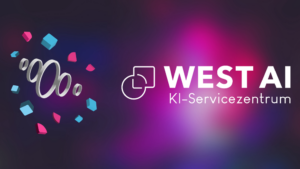Artificial intelligence (AI) is driving technological progress at an unprecedented speed, revolutionizing numerous industries and opening up enormous potential for the automation of intelligent tasks or the development of completely new products and services. While the introduction of AI is progressing rapidly in other parts of the world, Germany is still lagging far behind in both business and science, even though AI is considered a relevant topic by most. This is due to a lack of access to hardware resources and adequate services to support users, combined with a research gap in the development of scalable methods and systems.
Trained Models Accelerate AI Development
At the same time, as the current generation of deep learning AI systems becomes more accessible, a fundamental and groundbreaking change in AI is imminent: the shift to using very large, pre-trained models. These can be supplemented as a basis by task-specific training and lead to a quantum leap in prediction accuracy, quality and the scope of addressable tasks. Large models such as GPT-3 and other transformer models make it possible to tackle tasks such as understanding and even generating text and images with unprecedented potential. At the same time, however, these models require computing resources of the highest order of magnitude and are still difficult to train and transfer to new domains – especially for smaller companies and organizations.
The WestAI KI Service Center As a Central Point of Contact
To meet the new requirements and promote the spread of internationally competitive AI solutions in Germany and NRW, the WestAI Service Center was established. This is funded by the BMBF and supports research groups as well as small and medium-sized companies in the development and implementation of AI-supported workflows. WestAI consists of cooperating institutions with extensive experience that are characterized by research excellence in the fields of machine learning, artificial intelligence, and scalable computing. They also have expertise in the procurement, operation, and provision of large-scale computing infrastructures. In addition to RWTH Aachen University, the following partners are represented there: University of Bonn, Fraunhofer IAIS/FIT/SCAI, Forschungszentrum Jülich, Technical University of Dortmund and the University of Paderborn.
The WestAI AI Service Center focuses on three central approaches in its research and service offerings:
- WestAI researchers study and develop large, open and multimodal datasets as well as models designed for a variety of applications and challenges. The results of this research not only promote a deeper understanding of AI models, but also contribute directly to the optimization of their applications. The aim is also to make the models, data sets and expertise gained available to the public, e.g., in the form of a resource hub.
- WestAI’s service department supports research groups and commercial partners in adapting foundation models – i.e. generalized models – to their specific requirements. The consulting services range from initial advice on the feasibility of project ideas to implementation consulting, which culminates in a prototype. In addition, WestAI offers courses, training and best practices on various relevant topics.
- To support these processes and the concept phase, WestAI also provides powerful and scalable hardware resources and the associated AI frameworks.
The IT Center Strengthens the Project With a New HPC Cluster
The IT Center at RWTH Aachen University is also on board and, together with Forschungszentrum Jülich, will provide computing resources for WestAI over the course of the project. The new HPC cluster CLAIX-2023, which will go into operation in Q1 2024, will be equipped with 15 additional HGX computing nodes, each containing 4 NVIDIA H100 GPUs (60 GPUs in total). The IT Center is responsible for procurement, operation, and maintenance. In addition, solutions are being developed to provide WestAI users with uncomplicated and direct access to resources and the required software stack. This ranges from classic SSH access to interactive work via JupyterHub.
Further information can be found on the WestAI website.
Responsible for the content of this article are Jannis Klinkenberg and John Arnold.





